| Listing 1 - 10 of 125 | << page >> |
Sort by
|
Book
ISBN: 0231184042 0231545282 9780231545280 9780231184045 Year: 2017 Publisher: New York, NY
Abstract | Keywords | Export | Availability | Bookmark
 Loading...
Loading...Choose an application
- Reference Manager
- EndNote
- RefWorks (Direct export to RefWorks)
In this passionate and powerful book-part manifesto, part plan of action-the renowned economist Jeffrey D. Sachs offers a practical strategy to move America, seemingly more divided than ever, toward a new consensus: sustainable development. Sustainable development is a holistic approach that emphasizes economic, social, and environmental objectives in shaping policy. In focusing too much on economic growth, the United States has neglected rising economic inequality and dire environmental threats. Now, even growth is imperiled.Sachs explores issues that have captivated the nation and political debate, including infrastructure, trade deals, energy policy, the proper size and role of government, the national debt, and income inequality. Not only does he provide illuminating and accessible explanations of the forces at work in each case, but he also presents specific policy solutions. His argument rises above the pessimism born of political paralysis, economic stagnation, and partisanship to devise a brighter way forward, achievable both individually and collectively. In Building the New American Economy, Sachs shows how the United States can find a path to renewed economic progress that is fair and environmentally sustainable.
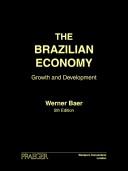
ISBN: 0313016097 9780313016097 1280315490 9786610315499 9798216960140 Year: 2001 Publisher: Westport, Conn. : London : Praeger, Bloomsbury Publishing,
Abstract | Keywords | Export | Availability | Bookmark
 Loading...
Loading...Choose an application
- Reference Manager
- EndNote
- RefWorks (Direct export to RefWorks)
Bringing the analysis of Brazil's economic performance up to date, Baer's classic text remains the only book in English to provide a thorough historical, statistical, and institutional description of the Brazilian economy. After touching on such issues as Brazil's early exporting economy, the impact of the industrialization process, and the historical struggle to bring inflation under control, the book turns to contemporary issues, the changing nature of Brazil's international trading and investment links, the process of privatization, environmental issues, and the economics of the health delivery system. Scholars, students, international institutions dealing with development, and corporate officers dealing with Latin America will welcome this up-to-date, definitive book on one of the world's largest economies.
POLITICAL SCIENCE --- Public Policy / Economic Policy --- Business & Economics --- Economic History --- Brazil --- Economic conditions.
Book
ISBN: 1447336909 144733681X 1447336828 1447336801 9781447336822 9781447336815 9781447336839 1447336836 9781447336907 9781447336808 Year: 2017 Publisher: Bristol, UK
Abstract | Keywords | Export | Availability | Bookmark
 Loading...
Loading...Choose an application
- Reference Manager
- EndNote
- RefWorks (Direct export to RefWorks)
After a meteoric rise, China's growth has come to a screeching halt. Salvatore Babones provides an up-to-date assessment of how China's economic problems are undermining its challenge to the Western-dominated world order. He tells how liberal individualism has become the leitmotif of American Tianxia.
China --- Foreign relations --- Economic conditions. --- United States --- Economic conditions --- POLITICAL SCIENCE / Public Policy / Economic Policy.
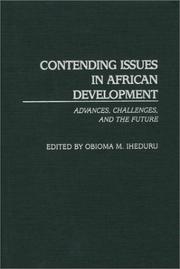
ISBN: 0313309612 0313001014 9780313001017 9780313309618 9798400631535 Year: 2001 Publisher: Westport, CT Greenwood Press
Abstract | Keywords | Export | Availability | Bookmark
 Loading...
Loading...Choose an application
- Reference Manager
- EndNote
- RefWorks (Direct export to RefWorks)
POLITICAL SCIENCE --- Public Policy / Economic Policy --- Business & Economics --- Economic History --- Africa --- Economic policy. --- Social policy. --- Eastern Hemisphere
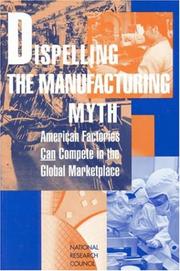
ISBN: 0309046769 9786610203390 1280203390 0309584167 0585158746 9780585158747 9780309046763 Year: 1992 Publisher: Washington, D.C. National Academy Press
Abstract | Keywords | Export | Availability | Bookmark
 Loading...
Loading...Choose an application
- Reference Manager
- EndNote
- RefWorks (Direct export to RefWorks)
POLITICAL SCIENCE --- Public Policy / Economic Policy --- Manufacturing industries --- Competition, International --- Industries --- Business & Economics --- Competition, International. --- International competition --- World economics --- International relations --- International trade --- War --- Economic aspects

ISBN: 030904779X 9786610246540 1280246545 0309584787 058514351X 9780585143514 9780309047791 9781280246548 6610246548 9780309584784 Year: 1992 Publisher: Washington, D.C. National Academy Press
Abstract | Keywords | Export | Availability | Bookmark
 Loading...
Loading...Choose an application
- Reference Manager
- EndNote
- RefWorks (Direct export to RefWorks)
POLITICAL SCIENCE --- Public Policy / Economic Policy --- Semiconductor industry --- Technology transfer --- Competition, International --- Industries --- Business & Economics --- Competition, International. --- International competition --- World economics --- International relations --- International trade --- War --- Economic aspects
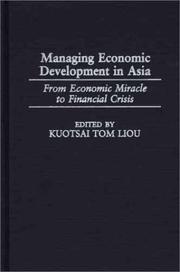
ISBN: 0275964299 9786610314973 1280314974 0313010544 9780313010545 9780275964290 9781280314971 6610314977 9798400682162 Year: 2002 Publisher: Westport, Conn. : London : Praeger, Bloomsbury Publishing,
Abstract | Keywords | Export | Availability | Bookmark
 Loading...
Loading...Choose an application
- Reference Manager
- EndNote
- RefWorks (Direct export to RefWorks)
POLITICAL SCIENCE --- Public Policy / Economic Policy --- Business & Economics --- Economic History --- Asia --- Economic policy --- Economic conditions --- Asian and Pacific Council countries --- Eastern Hemisphere --- Eurasia

ISBN: 0801446198 0801458250 9780801458255 9780801446191 9780801476228 0801476224 Year: 2011 Publisher: Ithaca, NY
Abstract | Keywords | Export | Availability | Bookmark
 Loading...
Loading...Choose an application
- Reference Manager
- EndNote
- RefWorks (Direct export to RefWorks)
One of the most vexing problems for governments is building controversial facilities that serve the needs of all citizens but have adverse consequences for host communities. Policymakers must decide not only where to locate often unwanted projects but also what methods to use when interacting with opposition groups. In Site Fights, Daniel P. Aldrich gathers quantitative evidence from close to five hundred municipalities across Japan to show that planners deliberately seek out acquiescent and unorganized communities for such facilities in order to minimize conflict. When protests arise over nuclear power plants, dams, and airports, agencies regularly rely on the coercive powers of the modern state, such as land expropriation and police repression. Only under pressure from civil society do policymakers move toward financial incentives and public relations campaigns. Through fieldwork and interviews with bureaucrats and activists, Aldrich illustrates these dynamics with case studies from Japan, France, and the United States. The incidents highlighted in Site Fights stress the importance of developing engaged civil society even in the absence of crisis, thereby making communities both less attractive to planners of controversial projects and more effective at resisting future threats.
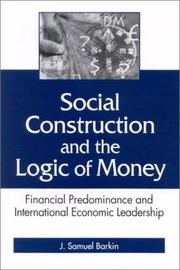
ISBN: 0791455815 0791487555 1417519290 9781417519293 0791455823 9780791455821 9780791455814 9780791487556 Year: 2003 Publisher: Albany, NY State University of New York Press
Abstract | Keywords | Export | Availability | Bookmark
 Loading...
Loading...Choose an application
- Reference Manager
- EndNote
- RefWorks (Direct export to RefWorks)
While other studies of international leadership have looked at a variety of measures to predict behavior, this book demonstrates that the key factor is international finance. J. Samuel Barkin uses an innovative blend of rationalist and constructivist methodologies, approaches to international political economy that normally exist in isolation from one another. Barkin argues that the level of a country's involvement in international finance specifically motivates it to lead. This is particularly relevant today, given the on-going discussions on how to respond to local and global financial crises. Barkin illustrates his theory with an episodic history of international monetary leadership over the last four centuries: Dutch leadership in the seventeenth century; British leadership in the nineteenth; the failure of leadership in the interwar era and Great Depression; and the role of the U.S. in the construction of an international economic infrastructure since World War II.
POLITICAL SCIENCE --- Public Policy / Economic Policy --- Finance --- Business & Economics --- Finance - General --- International economic relations --- Money --- Leadership --- History. --- Ability --- Command of troops --- Followership
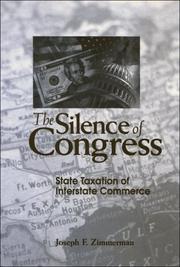
ISBN: 0791472051 0791479668 1435617460 9781435617469 9780791472057 9780791479667 Year: 2007 Publisher: Albany State University of New York Press
Abstract | Keywords | Export | Availability | Bookmark
 Loading...
Loading...Choose an application
- Reference Manager
- EndNote
- RefWorks (Direct export to RefWorks)
The Silence of Congress is the first book to examine state taxation of interstate commerce and the relative inactivity on the part of Congress to regulate such commerce. As states actively seek to maximize tax revenues, congressional silence has affected both citizens and corporations and resulted in myriad tax inequalities from one state to another on such things as personal income, estates, cigarettes and alcoholic beverages, tourism, and even visiting athlete status. Inconsistencies also affect a state's ability to attract and hold lucrative business investments such as sports franchises and gambling facilities. Noting that Congress has been slow to take advantage of the broad powers granted it by the United States Constitution in this area, Joseph F. Zimmerman evaluates the usefulness of Adam Smith's four universally acclaimed maxims of fair taxation and recommends changes to ground rules that would increase cooperation between states while aiding in the creation of a more perfect economic union.
POLITICAL SCIENCE --- Public Policy / Economic Policy --- Intergovernmental tax relations --- Interstate commerce --- Political Science --- Law, Politics & Government --- Public Finance --- States --- Taxation --- States. --- Commerce
| Listing 1 - 10 of 125 | << page >> |
Sort by
|

 Search
Search Feedback
Feedback About UniCat
About UniCat  Help
Help News
News